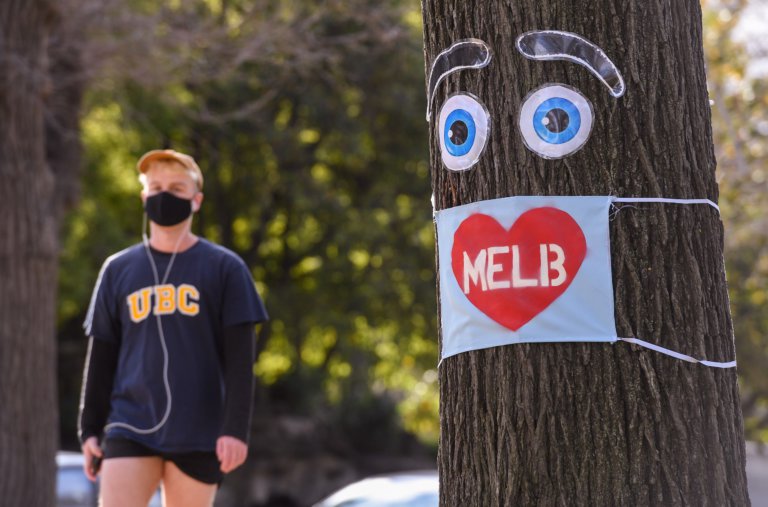
International students should now be aware of the latest lockdown in Melbourne. The city has moved from stage three to a stage four lockdown. It will last for six weeks until Sept. 13, 2020, and the state of Victoria in Australia has declared a state of disaster.
This is due to rising COVID-19 cases in the state, recording 439 new cases and 11 deaths in one day at the time of writing.
As international students buckle down at home while learning online, they will also have to comply with the new restrictions.
According to the latest statement from the Victorian Premier, all TAFE and university studies must be done remotely as part of the new restrictions.
The University of Melbourne stated on their website, “Unfortunately, classes scheduled to be held on campus or in-person on Monday, Aug. 3, 2020 and Tuesday, Aug. 4, 2020 will not go ahead as planned with the exception of some clinical placements. Subject coordinators will communicate directly with students about any specific arrangements for clinical placements.
“For all other students, you must not come to campus until you receive further advice from the University to do so.”
Here’s everything else all international students in Melbourne should know about the new lockdown:
Leaving your home

People walk past a near-deserted Flinders Street Station in Melbourne on August 3, 2020 after the state announced new restrictions as the city battles fresh outbreaks of the COVID-19 coronavirus. Source: William West/AFP
According to the new restrictions, international students in Melbourne are only allowed to leave your home for the following reasons:
- shopping for food and essentials (within a five-kilometre distance from your home unless the nearest supermarket is further than that)
- caregiving (leaving home for babysitting, taking care of the elderly or animals)
- daily exercise
- work (unless you can work at home)
- if you’re at risk of domestic violence
- applying for an intervention order
- attending court or a police station
- accessing medical services
There is also a curfew implemented in Melbourne between 8 p.m. and 5 a.m., so make sure to stay home during these hours.
You are also no longer allowed to exercise in groups larger than two, even for those living in the same household. Only one person per household is allowed to leave home per day for shopping purposes.
Visiting your boyfriend or girlfriend
If you’re in an intimate relationship and don’t live with your partner, don’t worry about having to start a long-distance relationship. You are allowed to visit your partner under the new restrictions.
According to The Guardian, you are allowed to visit a person if you are in an intimate personal relationship with them, even during curfew hours and if they live more than five kilometres away from your house.
No other visitors are allowed unless it is for the purpose of giving or receiving care.
Don’t panic-buy

People push their trolleys outside a Costco outlet in Melbourne on August 2, 2020. Source: William West/AFP
Food and grocery stores will remain open, so there is no need for panic-buying and joining the long queues being reported outside Coles and Woolworths.
Woolworths is restricting those in Victoria on buying more than two of certain essential items such as dairy, meat, vegetables, fish, and toilet paper.
Supermarkets, grocery stores, pharmacies, petrol stations, banks, and local bakers and butchers will be allowed to open, but pubs, bars, and nightclubs must be closed.
Restaurants and cafes will be closing from 11:59 p.m. on Aug. 5, 2020 for dine-in, and only takeaway and delivery will be allowed.
Fines for those who breach self-isolation
For those who have tested positive and in self-isolation, they will be fined 4,957 Australian dollars if they are found not at home when authorities come knocking at their door.
Those found repeatedly breaching the rules could face court proceedings and fines of up to AU$20,000.
If you’ve been asked to self-isolate, obey the law and stay at home until you’re given the all-clear to leave home. Doing so can save lives and prevent the dangerous spread of COVID-19.
Mandatory masks for international students in Melbourne
Since July 22, 2020, it is mandatory for those in metropolitan Melbourne to wear face coverings in public. This rule has been extended to the entire state since Aug. 2, 2020.
Those who have a medical reason are exempt and you don’t need to wear them if it’s not practical. For example, you don’t have to wear a mask when going out for a run, but you should wear one when shopping for groceries.
Liked this? Then you ll love…
Australian immigration: Negative net movement of students to continue
Student Stories: What it’s like to study in Queensland, Australia,







